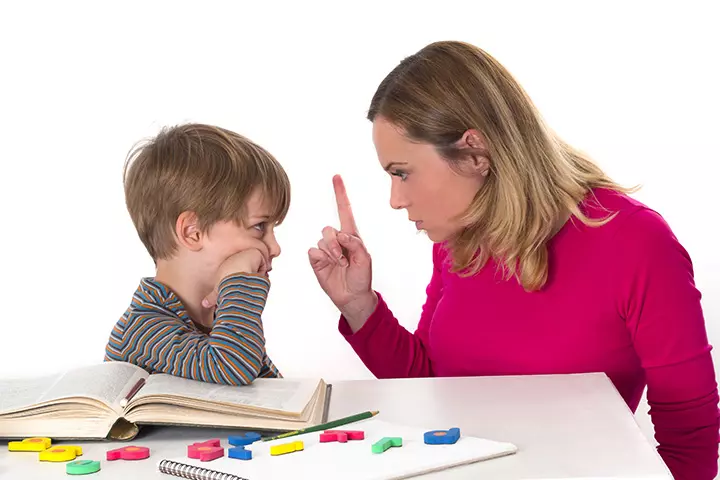
Image: Shutterstock
Parenting is a transformative journey filled with joys and challenges. Therefore, it’s crucial to reflect on our approach and recognize any subtle signs of hostility that may impact our children. In this article, we’ll explore some signs of hostile parenting and their consequences. By addressing them, we can create a nurturing environment where our children can thrive. Let’s embark on this journey of growth and provide our children with the love and support they deserve. Read on to know more about hostile parenting and how to deal with it!
1. Overly Harsh Discipline
While discipline is a necessary part of parenting, it’s essential to evaluate the way we enforce rules and consequences. If you find yourself resorting to overly harsh punishments or using physical or verbal aggression as a means of discipline, it’s time to reassess your approach. Hostile parenting often stems from unresolved anger or frustration, resulting in an environment of fear rather than one of growth and learning.
2. Lack Of Empathy And Emotional Support
Image: Shutterstock
Children need emotional support and validation from their parents. If you consistently dismiss or belittle their feelings, you may be exhibiting signs of hostile parenting. Avoid phrases like “stop crying” or “you’re overreacting.” Instead, practice active listening, acknowledge their emotions, and provide a safe space for them to express themselves without judgment.
3. Constant Criticism And Unrealistic Expectations
When we constantly criticize our children’s efforts, or set unrealistic expectations, we create an atmosphere of hostility. Constantly finding fault and never acknowledging their achievements can chip away at their self-esteem and motivation. Instead, focus on constructive feedback, praise their efforts, and celebrate their progress. Encouragement and support foster a positive parent-child relationship and would help you both grow.
4. Emotional Manipulation Or Guilt-Tripping
Image: Shutterstock
Using emotional manipulation or guilt-tripping as a tactic to control your child’s behavior is a clear sign of hostile parenting. Making them feel guilty for expressing their own desires or emotions can lead to emotional distress and a strained relationship. Instead, foster open communication, where your child feels safe expressing their thoughts and needs without fear of judgment or manipulation.
5. Lack Of Boundaries And Privacy Invasion
Respecting your child’s boundaries and privacy is crucial for healthy parent-child relationships. Constantly invading their personal space, reading their diaries or messages, and not respecting their need for privacy can create an atmosphere of hostility and erode trust. Allow them the space to grow and develop their independence while maintaining open lines of communication.
6. Inconsistent Parenting And Mixed Messages
Image: Shutterstock
Consistency is key when it comes to parenting. Sending mixed messages or having inconsistent rules can confuse your child and lead to frustration and hostility. Establish clear expectations and boundaries, and follow through with appropriate consequences. Consistency provides stability and security, nurturing a positive environment for your child’s growth.
7. Parental Alienation And Bad Mouthing
Engaging in parental alienation or badmouthing the other parent in front of your child is highly detrimental. It creates an atmosphere of hostility and places an unnecessary emotional burden on your child. Encourage a healthy relationship with the other parent, ensuring that your child feels safe and loved by both parents.
8. Ignoring Emotional Or Behavioral Issues
Image: Shutterstock
Dismissing or ignoring emotional or behavioral issues can contribute to a hostile environment. Recognize that children may struggle with their emotions or face challenges that require support and understanding. Stay attuned to their needs, seek professional help when necessary, and create a space where they feel comfortable expressing their concerns.
9. Using Fear Or Intimidation As A Parenting Tool
Resorting to fear or intimidation as a way to control your child’s behavior is a significant indicator of hostile parenting. Yelling, screaming, or using threats can instill fear in your child and create an environment of hostility and anxiety. Instead, practice effective communication and problem-solving techniques that promote understanding and cooperation. Encourage your child to express themselves without fear of harsh repercussions.
10. Lack Of Emotional Availability And Quality Time
Image: Shutterstock
Being emotionally available for your child is vital for building a strong parent-child bond. If you consistently prioritize other commitments over spending quality time with your child, it can lead to feelings of neglect and hostility. Make a conscious effort to engage in meaningful interactions, such as engaging in conversations, playing together, or participating in shared activities. Show genuine interest and actively listen to their thoughts and experiences, nurturing a positive connection.
Parenting is a continuous learning process, and it’s natural to make mistakes along the way. By recognizing the subtle signs of hostile parenting, we can make conscious efforts to cultivate a positive environment for our children. It’s important to promote open communication, empathy, and respect while setting realistic expectations and providing consistent support. Remember, fostering a nurturing and loving environment is the foundation for your child’s emotional well-being and overall development. Let us know in the comments any other point that might come to you regarding hostile parenting!

















